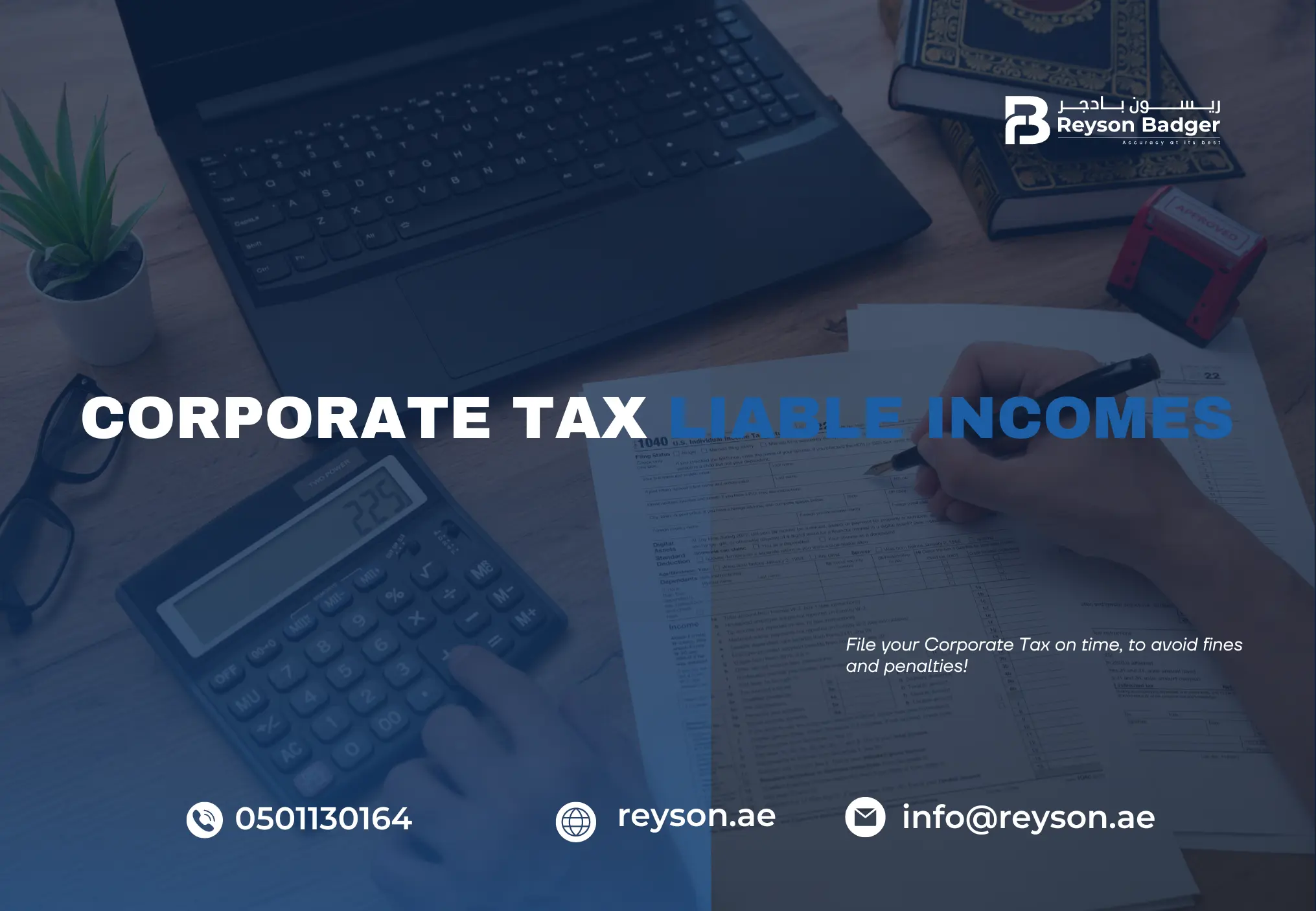
Liable incomes on corporate tax refer to the categories of income subject to taxation under the UAE's corporate tax framework. All annual taxable profits that fall under AED 375,000 shall be subject to a zero rate. Taxable profits exceeding AED 375,000 will be taxed at a rate of 9% annually. Corporate Tax Liable Income in Dubai include various forms of business profits, including revenue generated from goods and services, investment returns, and other business-related earnings. Understanding these liable incomes is crucial for businesses operating in Dubai, as it directly impacts their tax obligations and overall financial planning. Accurate identification and reporting of these incomes are essential to ensure compliance with local regulations and optimize tax liabilities.

The UAE introduced a 9% corporate tax in June, but businesses operating in free zones have special rules. A 0% corporate tax rate in Dubai provides substantial benefits to businesses that are operating in free zones. The framework of corporate tax in Dubai is distinctive and advantageous, providing companies with substantial benefits.
Corporate Tax Liable Income in Dubai is the business income subject to corporate tax in the UAE under the UAE Corporate Tax Law. This includes the income of business activities carried in the UAE and worldwide, excluding certain exempt types such as dividends, capital gains on qualifying shareholdings, and income from a qualifying free zone, provided conditions are met. Deductions available for business expenses, carried forward losses and specific allowances reduce taxable income.
All businesses and entities operating in the UAE that generate taxable income are required to register for corporate tax, regardless of their revenue. Corporate tax registration applies to both juridical persons, such as corporations, and natural persons who are self-employed and meet the income criteria.
The primary groups required to register for corporate tax in the UAE include:
In summary, the UAE’s corporate tax registration requirement encompasses nearly all business types to enhance transparency and streamline tax administration across the country
Certain entities and activities in the UAE are exempt from corporate tax, specifically to support social welfare and specific sectors. These exemptions include:
These exemptions aim to boost economic development, support government objectives, and enable organizations involved in social welfare to operate tax-free in the UAE.
Steps in Calculating Corporate Tax Liable Income in Dubai:
Calculate Gross Income: All revenues from domestic and foreign business activities. Exempt income is to be excluded, such as qualifying dividends and capital gains.
Deductions Allowed: Deduction on allowable expenses incurred during the course of business activities, for instance, rent, salaries, utilities, and many other costs of running the business.
Adjusting for Non-Deductible Expenses: Exclude that portion which is not deductible under the UAE Corporate Tax Law, such as personal expenses or fines.
Account for Tax Reliefs: Add carried-forward losses, qualifying donations, and other applicable deductions for tax reliefs or incentives.
Add Other Adjustments: Add or subtract unrealized profits, foreign currency gains/losses, or deferred income.
Calculate Taxable Income: The result is the Corporate Tax Liable Income, which then becomes subject to the applicable tax rate.
The core strategy of tax planning for any business is identifying the nature of taxable income. Understanding which types of income are liable can enable businesses to make better tax-planning decisions while reducing the tax burden and maximizing financial performance.
Knowing your taxable income can be helpful in several ways:
A company should deregister for corporate tax if the business stops operating or no longer has liable income. That would mean no tax will be collected on such income since no more income of this type will ever be generated. Failure to do so correctly might result in additional charges and penalties for the business.
Businesses are responsible for submitting returns stating their liable income for the year. This procedure assists in identifying the tax a company needs to pay according to its taxable earnings. Submitting these returns correctly guarantees that businesses fulfill their legal responsibilities and evade penalties.
The United Arab Emirates has strict rules. Companies are obligated to pay a 9% tax on every profit valued above AED 375,000. Businesses that earn less than this threshold are not liable to pay corporate tax. This system encourages small businesses, as they are exempt from tax liability on relatively lower profits.
Some types of income are excluded from corporate tax, indicating that companies are not responsible for taxation on earnings from these activities. For instance, revenue produced by governmental entities or particular activities in free zones might be free from taxation.
1. Calculating taxable Income:
Determine taxable income, and some may be hard to distinguish between liable and exempted income, such as income from free zones with specific tax rates.
2. Compliance with Current Regulations:
It is hard to keep track of all the changes in tax law and the registration and filing deadlines. Failure to do so will incur penalties; therefore, one must remain updated.
3. Common Reporting Mistakes
Addressing these challenges requires diligent financial planning, proper documentation, and expert advice to ensure accuracy and compliance with Corporate Tax Liable Income in Dubai.
Non-qualifying income is income subject to corporate tax under the UAE's tax laws. It does not benefit from exemptions and is taxed at the standard rate.
Here are some examples of non-qualifying income for which businesses might be required to pay corporate tax:
A business operating in the UAE mainland earns income from daily operations, that is, through sales or services. In such a case, would be classified as non-qualifying income and therefore eligible for corporate tax.
In case your business receives dividends from companies that do not qualify, then those are nonqualifying and subject to the general corporate tax rate.
Some investment incomes are not qualifying, like interest or dividends from firms not exempt from taxation. Such incomes will be taxed according to the corporate tax system.
There is 0% corporate tax in free zones, but companies need to qualify as Qualifying Free Zone Persons (QFZP). To achieve this, their income must be classified as Qualifying Income under the UAE's corporate tax law.
Qualifying Income is any income earned by a QFZP that qualifies for the 0% tax rate. This income must come from business activities or transactions that are considered qualifying within the specific free zone.
For more information visit UAE Corporate Tax Qualifying Income
A few factors we determine if someone qualifies for certain income benefits in a free zone:
We consider income as coming from transactions with someone in the free zone if that person actually benefits from the stuff or services being bought.
Beneficial recipients enjoy what is purchased without being obliged to pass it on to someone else.
In addition, we verify if the person in the free zone has a permanent business setup in the country. Then anyone from outside the country can be considered a member of the free zone.
Business operations in the free zone are subject to 9% corporate tax in Dubai. Qualifying Free Zone individuals' income is considered taxable income.
Income earned by a Qualifying Free Zone Person through a Domestic or Foreign Permanent Establishment will be treated as belonging to an independent entity related to the Qualifying Free Zone Person.
Income derived from transactions involving immovable property located in a Free Zone is considered taxable income and is taxed as follows:
The taxable income from these transactions for a specific tax period is the income payable to the immovable property calculated based on the relevant provisions of the Corporate Tax Law.
At Reyson Badger, we're the experts in tax consulting, especially when it comes to Corporate Tax Law. We'll keep you posted on all the latest changes regarding Corporate Tax in Free Zones. With our team of FTA Approved Corporate Tax consultants in the UAE, we provide a complete solution for Free Zones. We can help you ensure your income qualifies for 0% corporate tax in Dubai, as well as meet all the requirements.
1. What is considered exempt income under Corporate Tax Liable Income in Dubai?
Qualifying dividends, capital gains from eligible shareholdings, and income of qualifying free zone entities are included.
2. What are considered non-deductible expenses in calculating Corporate Tax Liable Income in Dubai?
Fines, penalties, and personal or non-business-related costs.
3. Are losses carried forward included in Corporate Tax Liable Income in Dubai?
Yes, carried-forward losses can be offset against Corporate Tax Liable Income in Dubai subject to specific conditions in the UAE tax regulations.
4. What is the corporate tax rate for Corporate Tax Liable Income in Dubai?
Corporate tax in Dubai is set at 9% for taxable income above the threshold defined in the UAE Corporate Tax Law.[
5. Do free zone entities have to calculate Corporate Tax Liable Income in Dubai?
Yes, qualifying free zone entities calculate Corporate Tax Liable Income in Dubai for income outside their qualifying activities.